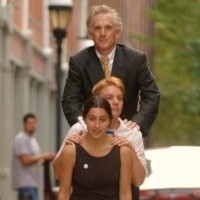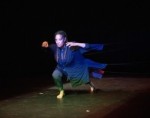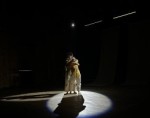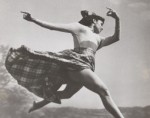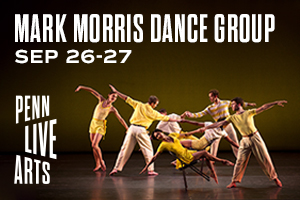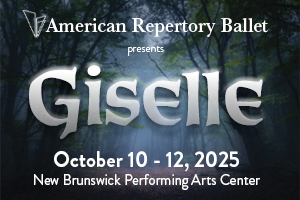
Faustin Linyekula, A Contemporary Dance Griot
by Jonathan Stein
After twenty years, FringeArts has discovered Africa. The festival, just ended, has brought us the fierce investigation of African masculinity and identity in portrait of myself as my father by Zimbabwean-born nora chipaumire; the theatrically and politically radical, virtual re-invention of opera in Macbeth by the South African company Third World Bunfight and director Brett Bailey; and the soulful and mesmerizing solo performance in Le Cargo by Faustin Linyekula/Studios Kabako of the Democratic Republic of Congo (DRC).
Linyekula’s country is neither democratic nor a republic and, unbeknownst to most of the world, has seen 10 million Congolese dead over the last 20 years from wars, famine, and chaos, adding to countless other victims in its Belgian colonial past. Indeed, Bailey’s Macbeth is set in the contemporary DRC. Yet the evening before Le Cargo opened, Linyekula was asked to introduce a documentary film on community empowerment in the Congo, and remarked that although he recognizes that “everything has collapsed, even the earth has collapsed” in his country, this “Macbeth is not the Congo I deal with every day. It is possible to be in the Congo and dream.”
We first see Linyekula on stage not as a dancer but as a slight figure approaching us out of the darkness of the stark set, with two books under one arm (by the philosopher and political scientist Achille Mbembe) and a drum with a sculpted figure under the other. Kneeling on one knee he asks self-reflective questions: “Have my stories of suffering made any difference to the people of the Congo,” “how do I dance,” and "what is my dance?” These existential questions about himself as an artist grip us as we know the choice he made in 2001 to return to live as artist and citizen in Kinsangani, choosing the “path of most resistance,” as Brenda Dixon Gottschild has commented.
He begins his storytelling and dance as he journeys in 2011 back to a forest village of his youth, Ubilo. His arms articulate both angular and curved pathways as his legs either stretch in close-to-the-ground lunges or, strangely, form a pyramid as his feet angle inwards and knees join at an apex. Linyekula sings mournfully and longingly over the pre-recorded sound of crickets, children laughing, and everyday speech of villagers, a community joining his darkened stage, his dance and song. He longs for Ubilo’s great dancers, and the master drummer Hanabutu, and we learn that they have since left their music to become church preachers. Linyekula sways his hips, drums the floor with his feet, and amidst a circle of low level spotlights that, like a fire in a forest clearing, cast large shadows of his body, he re-creates the ecstasy of a dance into the night to the shouts of “Jamos”—the encouragement that Hanabutu had as the master drummer given to his drummers. Linyekula’s cries of “Jamos" soon become disembodied, plaintive cries of memory and loss. The dancer has given us his story, and we now feel his solitude.
Le Cargo, Faustin Linyekula/Studios Kabako, FringeArts, Sept. 24, fringearts.com/event/le-cargo/.
By Jonathan Stein
September 28, 2016

